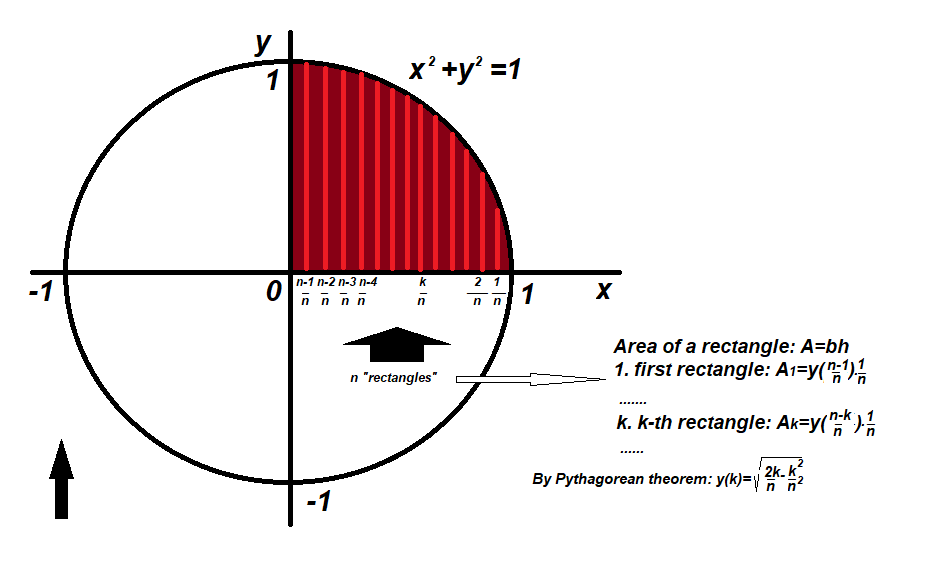Limit for you
n → ∞ lim k = 1 ∑ n n 4 n 2 k − n 2 k 2
The answer is 3.14159.
This section requires Javascript.
You are seeing this because something didn't load right. We suggest you, (a) try
refreshing the page, (b) enabling javascript if it is disabled on your browser and,
finally, (c)
loading the
non-javascript version of this page
. We're sorry about the hassle.
2 solutions
This is maybe not a rigorous solution, but this is how i came up with this question. Let's look at the circle with radius 1, and centered at (0,0). It's equation is:
x
2
+
y
2
=
1
Its area is
A
=
π
Now let's find its area in another way. We can compute the area with integral:
A
=
4
∫
0
1
1
−
x
2
d
x
=
4
4
π
=
π
Now, the sigma notation and limit in the question remind of the defintion of the definite integral:
∫
a
b
f
(
x
)
d
x
=
n
→
∞
lim
k
=
1
∑
n
(
n
(
b
−
a
)
f
(
a
+
n
k
b
)
)
And we can factor out the constant:
∫
a
b
f
(
x
)
d
x
=
n
→
∞
lim
n
(
b
−
a
)
k
=
1
∑
n
f
(
a
+
n
k
b
)
In our case:
a
=
0
b
=
1
And:
f
(
x
)
=
1
−
n
2
k
2
Now if we substitute
k
0
=
n
−
k
 ,(we are counting from right (1) to left (0)), we get:
∫
a
b
f
(
x
)
d
x
=
n
→
∞
lim
n
(
1
)
k
0
=
1
∑
n
1
−
n
2
n
2
−
2
k
0
n
+
k
0
2
4
π
=
∫
a
b
f
(
x
)
d
x
=
n
→
∞
lim
n
1
k
0
=
1
∑
n
n
2
k
0
−
n
2
k
0
2
This is equivalent with:
n
→
∞
lim
k
=
1
∑
n
n
4
n
2
k
−
n
2
k
2
=
π
,(we are counting from right (1) to left (0)), we get:
∫
a
b
f
(
x
)
d
x
=
n
→
∞
lim
n
(
1
)
k
0
=
1
∑
n
1
−
n
2
n
2
−
2
k
0
n
+
k
0
2
4
π
=
∫
a
b
f
(
x
)
d
x
=
n
→
∞
lim
n
1
k
0
=
1
∑
n
n
2
k
0
−
n
2
k
0
2
This is equivalent with:
n
→
∞
lim
k
=
1
∑
n
n
4
n
2
k
−
n
2
k
2
=
π
Relevant wiki: Riemann Sums
S = n → ∞ lim k = 1 ∑ n n 4 n 2 k − n 2 k 2 = 4 ∫ 0 1 2 x − x 2 d x = 4 ∫ 0 1 1 − x 2 d x = 4 ∫ 0 2 π cos 2 θ d θ = 4 ∫ 0 2 π 2 1 + cos ( 2 θ ) d θ = 2 [ θ + 2 sin ( 2 θ ) ] 0 2 π = π ≈ 3 . 1 4 2 By Riemann sum n → ∞ lim n 1 k = a ∑ b f ( n k ) = n → ∞ lim ∫ n a n b f ( x ) d x Using identity ∫ a b f ( x ) d x = ∫ a b f ( a + b − x ) d x Let x = sin θ ⟹ d x = cos θ d θ Note that cos 2 θ = 2 cos 2 θ − 1